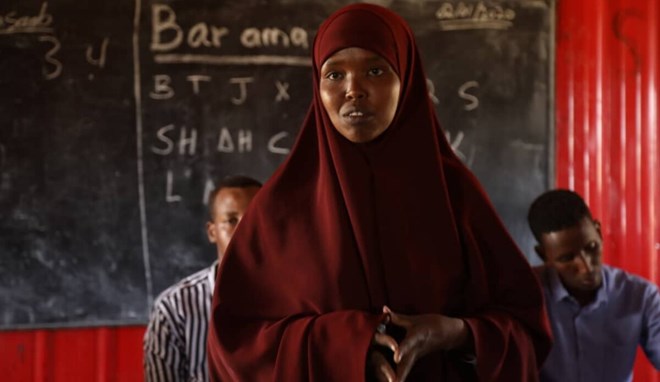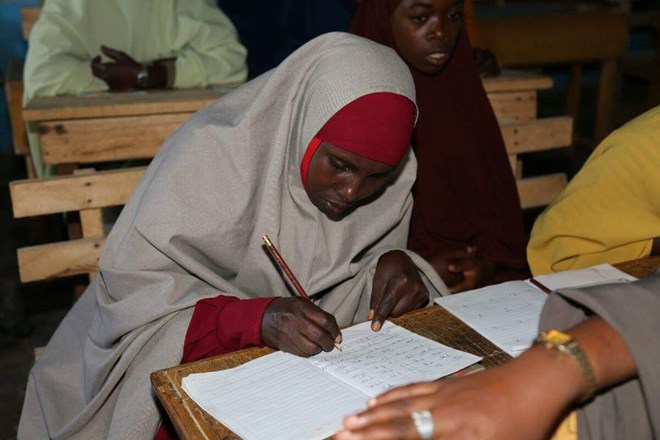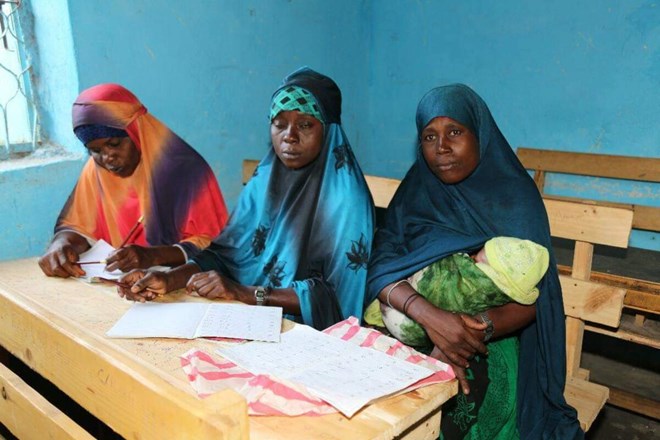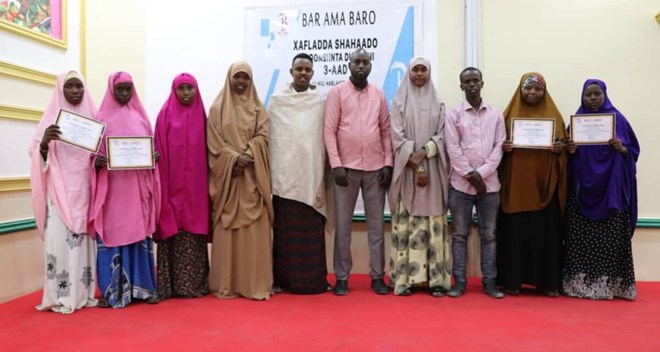
Thursday October 15, 2020

Kismayo – Amina Abdi Ali started an adult literacy programme for women in the southern Somali city of Kismayo in 2016 with high hopes of making a difference in the lives of her fellow Jubalanders.
But now, after five years and more than 450 beneficiaries from her reading, writing and numeracy classes, she still avoids resting on her laurels – if anything, she is even more driven than before.
“I have never left Somalia. I understand deeply what the women of this country need in terms of education and vocational skills training, and giving them much-needed opportunities. By making this kind of effort in these areas, I am hopeful they will be able to accomplish more,” says Ms. Ali.
In her regular teaching work, Ms. Ali lectures her young students about the importance of education, and how it can be a springboard for opportunities as Somalia continues developing after its many years of conflict.
Those lectures to young students spilled over into her other teaching work.
Ms. Ali first developed an interest in educating a different group of students after noticing older women struggling to send money on EVC Plus, an electronic money transfer commonly used in south and central Somalia.

Now, away from the children’s classrooms, much of her spare time is dedicated to helping Somali women improve their basic literacy and numerical skills, especially as many missed out on a formal education due to the country’s civil war in the 1990s and the ensuing conflict and strife.
**Literacy and development **
She strongly believes there is a direct link between literacy and Somalia’s development into a peaceful and stable country.
“If development is the vehicle that will take us to a better quality of life here in Somalia, then literacy is the driver of that vehicle,” Ms. Ali says, adding that without programmes like hers many local women in Kismayo would simply not be able to make up for their lack of education due to limited opportunities and other responsibilities such as work and family.
“I started this programme bearing in mind that education is the only way we can promote peace and development in our country and ensure that we move in the right direction,” she adds. “The programme is meant to benefit both young and old women who could not access education.”

Among those who completed Ms. Ali’s programme is Falastin Haji Ahmed, a 30-year-old mother and shop-owner, who did not know how to read and write before a friend recommended that she join the literacy classes.
“It is due to the conflict that many women like me became the main breadwinners of their families. It often meant work as street vendors and running small shops in Kismayo and other towns, but we often lacked the skills and capacity to grow our businesses,” Ms. Ahmed says.
“The programme opened my eyes. It gave me an opportunity that I had missed during the years when I should have been at school,” she continues. “Today, I can write shopping lists, and calculate the profits or losses of my business. Before, I was asking friends to check for my mobile money transfers, as well as handing calculations – but not anymore.”

Education and politics
Ms. Ali sees a natural link between literacy and the full participation of women in Somali life, and not just in the business sector – she says her work in women’s literacy feeds into her other activism centred on political representation.
“Fatima Maalim Ali – a member of Jubaland’s state assembly – was among the women I have mentored and encouraged to run for parliament and, thanks to God, she has realized her ambitions and she also continues to advocate for women and girls at the state assembly,” Ms. Ali says, noting that she is particularly encouraging women to get involved in the country’s upcoming elections.
Ms. Ali’s literacy programme covers the city of Kismayo and its surrounding area, including the nearby villages of Goobweyn, Yontoy, Bulagaduud and Qamqam. Its resources are tight with much of the actual teaching relying on the goodwill and commitment of some of the activist’s fellow teachers.
“I often face challenges in funding the programme,” Ms. Ali says. “There are eight teachers who volunteer to help me provide lessons at different locations, and I could not do this without them. In addition to their knowledge, they also bring optimism and vigour and help these women realize their full potential. Literacy expands life opportunities for everyone, it will significantly reduce poverty among the population, discouraging people to commit crimes or get recruited by armed groups.”

Supporting literacy
According to the UN-backed survey in 2006, the adult literacy rate for women in Somalia was estimated to be 26 per cent, up from 19 per cent in 2001. For the same time period, the literacy rate was 36 per cent for men, up from 25 per cent in 2001, and 31 per cent for both men and women.
The United Nations has long advocated for the education of women and girls as a basic human right, highlighting how inequalities in education can cripple the lives of millions of women and girls worldwide. It has stated that with quality education, women and girls can shape the world according to their aspirations, making informed choices, improving the lives of their families and communities, and promoting the health and welfare of the next generation – essentially, that it is one of the strongest foundations for lasting peace and sustainable development.
The issue of adult learning and education was a particular focus of a meeting of the General Conference of the United Nations Educational, Scientific and Cultural Organization (UNESCO) in Paris in late 2015, at which the Recommendation on Adult Learning and Education (RALE) was adopted.
According to the RALE, “The aim of adult learning and education is to equip people with the necessary capabilities to exercise and realize their rights and take control of their destinies. It promotes personal and professional development, thereby supporting more active engagement by adults with their societies, communities and environments. It fosters sustainable and inclusive economic growth and decent work prospects for individuals. It is therefore a crucial tool in alleviating poverty, improving health and well-being and contributing to sustainable learning societies.